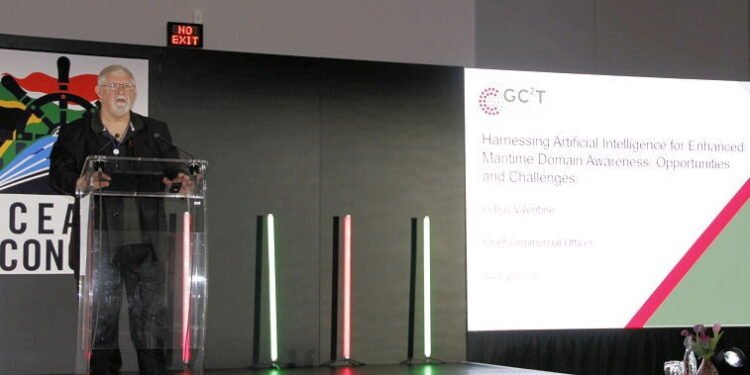
Cape Town recently hosted the Ocean Economy Conference, where Cobus Valentine (Chief Commercial Officer of Global Command and Control Technologies – GC2T) delivered an insightful speech on the transformative potential of artificial intelligence (AI) in maritime domain awareness (MDA).
Valentine emphasised that South Africa is well-equipped to innovate in AI without relying solely on foreign technologies, and encouraged leveraging local capabilities for advancements in AI and maritime technology.
He pointed out that “the traditional belief that humans are solely responsible for war and strategy no longer holds true in the face of AI advancements. Artificial intelligence is transforming how we approach these domains, offering new perspectives and solutions.”
Valentine painted a picture of an expanding threat environment within the maritime domain. He explained that the vast and complex maritime landscape is crucial to global trade, with over 90% of global goods being transported by sea. However, this critical infrastructure faces numerous threats, from piracy and terrorist activities to cyberattacks targeting maritime infrastructure.
He cited examples such as China’s extensive military exercises around Taiwan and the growing sophistication of non-state actors with advanced weaponry. Additionally, cyberattacks have become a pressing concern, with South Africa experiencing a significant increase in such incidents, and Transnet some years ago being shut down by cyber attacks. In 2023, for instance, 60% of South African companies were targeted by ransomware, demonstrating the vulnerability of maritime and related infrastructures.
MDA involves achieving a comprehensive understanding of all activities at sea that could impact security, safety, the environment, and economic well-being. Valentine explained that this requires the integration of data from various sources, such as satellite imagery, radar systems, automatic identification systems (AIS), and underwater sensors. This data fusion creates a common operating picture, enabling better-informed decisions. Effective MDA is essential for deterring illegal activities, monitoring vessel traffic, and supporting law enforcement operations.
Valentine noted the limitations of traditional MDA, such as the vast scope and complexity of maritime areas, manual data analysis and the need for effective information sharing and cooperation. These challenges can lead to time-consuming processes and difficulty in identifying threats in real-time.
AI can significantly enhance MDA by analysing vast amounts of data from diverse sources, identifying patterns and anomalies and predicting potential threats. Key benefits of AI-powered MDA include improved threat detection and response times, more efficient resource allocation and enhanced decision-making processes. AI can also support autonomous vessels and drones, further improving surveillance and monitoring capabilities.
Valentine cautioned about challenges such as data quality and bias, explainability and transparency of AI decisions and the potential for cyber threats targeting AI systems. Addressing these issues is crucial for effective AI implementation in MDA, ensuring it aligns with international standards, norms and human rights principles. Valentine stressed the need for continued human expertise and oversight to complement AI systems.
Concluding, Valentine expressed optimism about the future of AI in enhancing MDA.
“By harnessing the power of AI, the maritime sector can move towards a safer, more sustainable and more efficient future,” he said. “However, it is crucial to address the challenges associated with AI implementation to ensure it aligns with international norms and human rights principles.”









